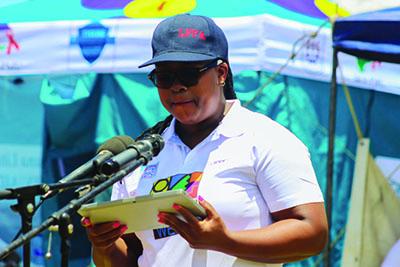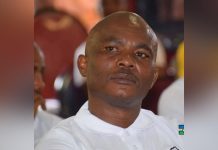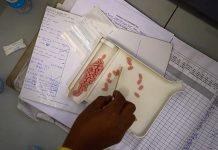Africa-Press – Lesotho. Mokhotlong District Administrator (DA) Serame Linake launched the Districts Fast Track Plans (DFTPs) for 2020/21 – 2022/23 at the event held at Mapholaneng.
According to National AIDS Commission (NAC) at least 90 percent of the population living in this district, from the age of 15 and above, should have “accessed combination
HIV prevention” by 2023. NAC says that the DFTPs have been established to “decentralise and to achieve the 40 % community led HIV/AIDS response based on the unique District profiles to
address district specific HIV and AIDS programmes. “Lesotho was identified as a Fast Track Country with a severe epidemic by UNAIDS [United Nations programme on HIV/AIDS] in 2016-2021 strategy.
Hence the DFTPs were identified to be an appropriate approach through which decentralised HIV and AIDS response could be achieved. The management of the non-clinical HIV and
AIDS response is based on the unique District profiles to address district specific HIV and AIDS programmes. ” Addressing the gathered congregation, Linake urged the spread of the word about prevalence of
HIV in their communities. He further cautioned them against early childhood marriages. The DA also came down hard against the Gender Based Violence (GBV),
saying that the perpetrators should be reported to the police for the law to take its course. It is feared that the ongoing construction project of Polihali
Dam in Mokhotlong could expose the adolescents living along the project vulnerable to cross-generational sex, early childhood marriages and increased HIV infections.
Also the construction workers are classified as risk groups due to living away from families, thus are feared to be exposed to risks of HIV infection.
The Lesotho Planned Parenthood Association (LPPA), which is also the government’s partner against the fight of HIV/AIDS and was active in formation of the districts plans said the plans could not have come at an opportune time.
The LPPA’s Chief Executive ‘Mamojela Koneshe said, “this event marks a long journey that ought to have begun a long time ago; a journey of helping our adolescents
and young people lead meaningful lives. Investing in our young people is no longer optional. We found out that poverty is one of the main factors that
render our young girls vulnerable to HIV/AIDS, Teenage Pregnancies, Sexual and Gender-Based Violence, followed by scarce Sexual and Reproductive Health and
Rights information and services. We have further discovered that these challenges hit hard on girls from poor rural backgrounds. ” Koneshe further said that they will support
the young girls as they are vulnerable to many challenges. “We are driven by the voice of a 17-year-old girl (Halimah) who in her own words said “every girl
has the right to access services and information to make informed decisions and should be supported to turn these decisions into reality” (“Girls Decide” by
IPPF, 2011). ” Pledging their support and commitment, the LPPA’s Chief Executive said they will endeavour to render youth friendly Sexual and Reproductive
Health and Rights Information and Services. Speaking on behalf of the NAC Chief Executive Officer, Teboho Mohlabi said Mokhotlong district is most vulnerable as a result of the ongoing projects happening in
that district. He said the Commission will go back to Mokhotlong early next year; a move which he said will amplify awareness against HIV risk and high-risk sexual behaviour.
Mohlabi appealed to the youth to build resilience against challenges confronting them. Polihali Dam project’s Operations Manager Gerard Mokone said theirs is to contribute to
bring infrastructural developments. Mokone said they have undertaken based line studies of health before commencing their work and had engaged the reports to
assess the prevailing situation in Mokhotlong, adding that they had established that the district prior to the Polihali project had high rate of HIV infections.
He also pledged to support the health services. The Operations Manager said it is not the project which is going to bring about high rate of infections but could “contribute” high prevalence.
Mokone also promised to join forces with government and relevant stakeholders to curb high rate of infections. He further said they will assist the Ministry of Health with
outreach projects and had signed the memorandum of understanding. “LHDA [Lesotho Highlands Development Authority] pledges to see to it that there be no
new infections,” he charged. It is expected that the DFTPs will be operationalised at the district level, a move to decentralise and tailored HIV/AIDS responses per the districts challenges and each district has their own. The NAC will coordinate efforts towards its realisation. Lesotho aspires to end AIDS by 2030.
For More News And Analysis About Lesotho Follow Africa-Press






